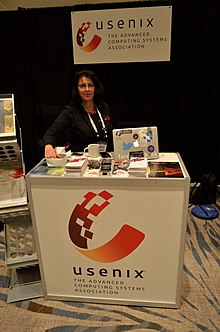USENIX
 USENIX: The Advanced Computing Systems Association | |
| Formation | 1975[1] |
|---|---|
| Headquarters | Berkeley, California, United States |
President | Amy Rich |
| Website | www |

USENIX is an American 501(c)(3) nonprofit membership organization based in Berkeley, California and founded in 1975 that supports advanced computing systems and operating system (OS) research.[2] Its stated mission is to foster technical excellence and innovation, support and disseminate research with a practical bias, provide a neutral forum for discussion of technical issues, and encourage computing outreach into the community at large.[2]
History
USENIX was established in 1975 under the name "Unix Users Group," focusing primarily on the study and development of the Unix OS family and similar systems. In June 1977, a lawyer from AT&T Corporation informed the group that they could not use the word "Unix" in their name as it was a trademark of Western Electric (the manufacturing arm of AT&T until 1995), which led to the change of name to USENIX.[3] It has since grown into a respected organization among practitioners, developers, and researchers of computer operating systems more generally. Since its founding, it has published a technical journal entitled ;login:.[4]
USENIX was started as a technical organization. As commercial interest grew, a number of separate groups started in parallel, most notably the Software Tools Users Group (STUG), a technical adjunct for Unix-like tools and interface on non-Unix operating systems, and /usr/group, a commercially oriented user group.
USENIX's founding President was Lou Katz.
Conferences
USENIX hosts numerous conferences and symposia each year, including:
- USENIX Symposium on Operating Systems Design and Implementation (OSDI) (was bi-annual till 2020)
- USENIX Security Symposium (USENIX Security)
- USENIX Conference on File and Storage Technologies (FAST)
- USENIX Symposium on Networked Systems Design and Implementation (NSDI)
- USENIX Annual Technical Conference (USENIX ATC)
- SREcon, a conference for engineers focused on site reliability, systems engineering, and working with complex distributed systems at scale
- LISA, the Large Installation System Administration Conference
- Enigma, a conference focused on practical privacy and security expertise and knowledge sharing in a welcoming and inclusive environment
Publications
USENIX publishes a magazine called ;login: that appears four times a year.[5] From 2021, it has become an all-digital magazine and openly accessible. ;login: content informs the community about practically relevant research, useful tools, and relevant events.
From 1988-1996, USENIX published the quarterly journal Computing Systems, about the theory and implementation of advanced computing systems in the UNIX tradition. It was published first by the University of California Press, then by the MIT Press. The issues have been scanned and are online.[6]
Open access
USENIX became the first computing association to provide open access to their conference and workshop papers in 2008.[7] Since 2011, they have provided audio and video recordings of paper presentations and conference talks in their open-access materials, free of charge.
USENIX Lifetime Achievement Award
This award, also called the "Flame" award, has been presented since 1993.[8]
- 2020 Chet Ramey
- 2019 Margo Seltzer
- 2018 Eddie Kohler
- 2014 Thomas E. Anderson
- 2012 John Mashey
- 2011 Dan Geer
- 2010 Ward Cunningham
- 2009 Gerald J. Popek
- 2008 Andrew S. Tanenbaum
- 2007 Peter Honeyman
- 2006 Radia Perlman
- 2005 Michael Stonebraker
- 2004 M. Douglas McIlroy
- 2003 Rick Adams
- 2002 James Gosling
- 2001 The GNU Project and all its contributors
- 2000 W. Richard Stevens
- 1999 "The X Window System Community at Large"
- 1998 Tim Berners-Lee
- 1997 Brian W. Kernighan
- 1996 The Software Tools Users Group (Dennis E. Hall, Deborah Scherrer, Joe Sventek)
- 1995 The Creation of USENET by Jim Ellis, Steven M. Bellovin, and Tom Truscott
- 1994 Networking Technologies
- 1993 Berkeley UNIX
See also
- AUUG
- LISA (conference)
- Marshall Kirk McKusick
- LISA SIG: Formerly SAGE (organization)
- Unix
References
- ^ Salus, Peter H. (25 April 2008). "USENIX History : Thirtieth Anniversary, USENIX Association". USENIX. Archived from the original on 21 November 2017. Retrieved 2020-04-12.
June 18, 1975. CUNY in Manhattan. Mel Ferentz runs the first USENIX conference. Of course, it wasn't called USENIX then, it was a UNIX users' group, until the lawyers at AT&T; got tough about that (tm). And it wasn't the first meeting, either, as Lou Katz had run a small meeting in a conference room at Columbia in May 1974. But there were "about 40 people from 20 institutions" at the 1975 meeting.
- ^ a b "About USENIX". USENIX. 2017-04-21. Retrieved 2022-05-21.
- ^ Lehey, Greg (June 2003). "President's Column". AUUGN. 24 (2). AUUG, Inc.: 3. Retrieved June 3, 2010.
- ^ ;login: The USENIX Magazine
- ^ "USENIX ;login: | The Advanced Computing Systems Association". www.usenix.org. Retrieved 2021-07-13.
{{cite web}}: CS1 maint: url-status (link) - ^ Computing systems: A quarterly publication of the USENIX Association, at usenix.org
- ^ USENIX Supports Open Access
- ^ "USENIX Flame Award". USENIX. 6 December 2011. Retrieved 2018-12-22.
